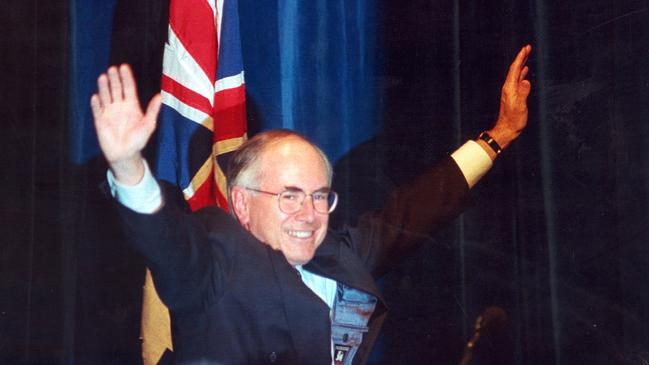Howard anniversary a chance to recall his Coalition lessons in unity

As we approach March 2, the 25th anniversary of the election of the Howard government in 1996, it is instructive to reflect on the experience of John Howard’s Coalition.
The art of coalition government is a delicate and sometimes difficult balancing of policy, politics and personalities. Howard was a staunch coalitionist. But he recognised that all modern political parties are essentially coalitions, and keeping coalitions together is about managing people: their expectations, their ambitions and their egos.
Howard continued a long tradition. Australia’s non-Labor Coalition has existed almost since the founding of the Country Party in 1920; it has helped shape the content and conventions of Australian politics.
The Nationals leader, for example, is the deputy prime minister of a Coalition government since that office was first gazetted in 1968, but earlier conventions about the allocation of the Treasury and trade portfolios have proved malleable. Ministries still are allocated in proportion to the parliamentary seats of the partners, despite grumblings about ministries’ relative importance.
Howard was a supporter of the Coalition arrangement long before he became prime minister. His maiden speech to the House of Representatives in 1974 praised its value.
Coalition disunity was a factor in Howard’s defeat at the 1987 federal election, under the strains of the Joh for Canberra campaign. Yet Howard, characteristically, persevered. During his first term as prime minister he invited the Nationals into government despite the Liberals being able to govern in their own right. The Howard government’s guns policy was an early test of the Howard Coalition, yet it was supported by the Nationals leadership, ahead of their own immediate and perhaps long-term political gains.
Three fundamental challenges to the functioning and future of the Coalition became apparent during the Howard government, and remain.
First, there is a consistent demographic trend away from rural life in Australia; and mining rather than agriculture has become our dominant export earner. In the 1970s even hard-headed National Country Party minister Peter Nixon recognised that the electoral arithmetic was moving inexorably against the Nationals. Across the Howard government itself, Nationals’ seats in the house declined by almost half.
Nevertheless, rural and regional Australians feel themselves as distinct and generally disadvantaged. They look to their parliamentary representatives to stand up for a way of life that, however diminished, continues to shape popular notions of an Australian identity. They remain a constituency to be reckoned with.
Second, being a junior partner in governments that have held power nationally for 49 of the past 71 years brings with it an unexpected challenge: the Nationals are constantly in danger of being overshadowed. Howard’s dominance of the political landscape through his extended term as prime minister added to this effect. “Coalition” became almost synonymous with “Liberal”, a point former Nationals leader John Anderson reflected when he said, in effect, that Howard almost killed the Nationals with kindness. Nationals today are understandably keen to remind voters of their presence.
Third, in a democracy, pragmatism and compromise are the order of the day. A recurrent nightmare of any party that is serious about holding government is being outflanked by rivals with appeals to ideological purity, but with no prospect of making hard decisions. On the non-Labor side, the threats are chiefly from a more conservative politics, hostile to progressive social issues.
The Nationals are further assailed by locally prominent independents and minor parties that trade on larger-than-life personalities. Such non-Labor challengers to the Coalition might best be described as populists, attracting votes by denouncing “ordinary” politics as ineffectual and corrupted, and offering simplistic solutions to complex problems that target “outsiders” as the root of all their troubles.
The Coalition’s longevity belies the delicate managing required for its maintenance. Of course, there are important incentives: it provides the Nationals with an influence in government decision-making out of all proportion to their electoral support; and the Liberals gain access to a significant constituency they otherwise might struggle to reach.
Some Nationals feel they get the worst part of the deal. Attempting to differentiate their “product” around colourful personalities or hot-button issues may provide short-term breathing space and satisfy some personal ambitions, but it is not a long-term solution.
Above all, the Coalition relationship cannot be taken for granted. The Liberals must give and be seen to give appropriate recognition to Nationals’ contributions. The Nationals must find a distinctive voice that is complementary to, not destructive of, the Coalition. Differences are inevitable and their settlement generally productive. Whether and how disagreements are played out in the public arena, however, should be an exercise in restraint, best done by cool heads. The Howard government exemplified a strong Coalition at work, pragmatically blending common purpose and rivalry. But the work of jointly building a coherent account of the national interest is never complete.
David W. Lovell is a professor at UNSW Canberra and director of the John Howard Prime Ministerial Library. The online conference Howard Government Retrospective V: The Coalition will be held on March 2.


